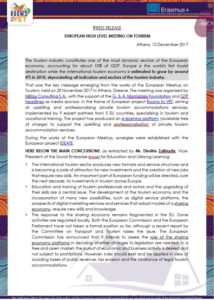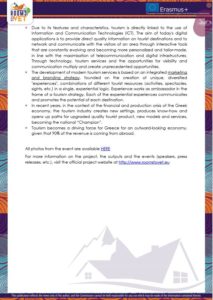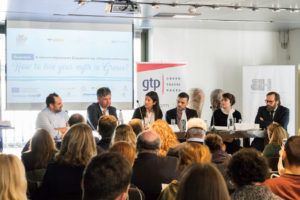Final Event of Rooms to VET in Athens



 |
 |
Rooms to VET
Upskilling and professionalization of private sector tourism accommodation services
Project Number: 2015-1-HR01-KA202-013096
STUDY ON PRIVATE TOURISM ACCOMODATIONS
STATE OF THE ART, CHALLENGES AND PROSPECTS FOR DEVELOPMENT
INTELLECTUAL OUTCOME 1
EXECUTIVE SUMMARY
Europe is the world’s no. 1 tourist destination, with the highest density and diversity of tourist attractions. The European region, as a whole, represents 51.7% of the total world arrivals, of which the EU-28 countries represent 39.5% while Southern/Mediterranean Europe attracts 18.6% of that figure. As a result, the tourist industry has become a key sector of the European economy, generating over 10% of EU GDP (directly or indirectly) and employing 9.7m citizens in 1.8m businesses.
ROOMS2VET is an EU funded project (through Erasmus+. KA2), addressing providers and wannabe providers (owners, managers, staff) of private tourism accommodation services, including apartments, small residences and family arrangements as well as VET trainers in the project target countries (Croatia, Cyprus, Greece, Slovenia, Spain) and beyond. On the basis of an extensive research, best practices identification and a thorough needs analysis, Rooms to VET project is to develop learning material and a free, online training platform to help the providers of private tourism accommodation services make the most of their tourism activities or businesses and grasp the profit from the emerging sustainable and alternative tourism trends.
The training platform will consist of 6 Modules, translated in all 5 project languages (English, Croatian, Greek, Slovenian, and Spanish) on different and equally important aspects:
Module 1: Hospitality and service culture
Module 2: Planning for success
Module 3: Running your business day to day
Module 4: Face-lifting your business
Module 5: Creative and innovative products and services
Module 6: Promoting and selling effectively
This executive summary is part of the project O1: “Study On Private Tourism Accomodations: State Of The Art, Challenges And Prospects For Development”, in particular presents the EU report of Activity 3: Final integrated Study (with ANNEX: specific country reports and translation of executive summaries from EN into ES, HL, HR, SI).
The concept of private accommodation in the course of tourism history has been variously defined. In the English speaking parts of the world, private accommodation is most commonly referred to as bed and breakfast (B&Bs), homestays, pensions, guesthouses and agro-tourism.
Also the term “private tourism accommodation” refers to tourism accommodation that do not conform to the definition of ‘‘establishment’’ (Demunter, 2009). Indicative of private tourist accommodations is that they provide a limited number of rooms and bed-places and in some cases guests are sharing accommodation facilities and amenities with the family which is, at the same time, the owner of the accommodation facility. It is this connection between guests and hosts that creates the “home atmosphere” which is the most important element of the attractiveness of this form of accommodation.
Generally speaking, those types of accommodation facilities are usually small, between 1 and 25 rooms, although the number of rooms and type of their formal registration mostly depends on national legislation and guidelines defined by private accommodation professional associations.
We have included a special note in our study regarding the sharing economy and its impact in Tourism (EUROPARLIAMENT Briefing September 2015 The sharing economy and tourism Tourist accommodation), that explains how recently, a growing number of individuals are proposing to share temporarily with tourists what they own (for example their house or car) or what they do (for example meals or excursions). This type of sharing is referred to as the ‘sharing economy’.
The response to the sharing economy remains fragmented in the EU. Some activities have been regulated at local level. Neither the European Commission nor the Parliament have taken an official position so far, though a recent report from the Transport and Tourism Committee touches upon the issue. The Commission has announced that it plans to assess the role of platforms in order to see if any changes or new legislation is needed.
There are several groups of private accommodation providers that have been identified in the reports:
– The first group is permanent residents of a specific touristic destination usually formed by families with some kind of tradition hosting tourists;
– The second group is made by the owners of town homes or apartments that have moved to major cities but still hold a second residence and rent it.
– The third group is people building or purchasing a second home in the same town and renting the entire home or extra rooms to tourists during summer.
=
The group most probably holding the least experience in hospitality (and sometimes even not officially registering their facilities in any way) is the third one, even though inexperienced hosts may also come from the second group.
In the collection of data from the report there is a lack of information regarding the target group, mainly due to the lack of policy orientation towards private accommodation. However, in the Croatian report we find that even though there is an overall lack of insights into private accommodation owners’ profile, motivations, business practices and profitability, results from 3 studies show:
Residents of Croatian destinations are generally favourably disposed to tourists
Private accommodation owners general profile:
o Are relatively well educated 38% holding a university degree,
o The average owner of a family accommodation is involved in this form of tourism for 7 years of more
o For the owners of private accommodation 40% of the revenue from private accommodations supplement the income from employment; 30% from retirement, while for 21% it is the main source of income.
They are “technology oriented”: 58% of the owners have their own web page of the accommodation facility, 63% of their sites is customized for the mobile devices, 85% of accommodation have wireless Internet access, and 97% facilities provide free Wi-Fi for customers.
Regarding the use of ICT, according to Eurostat ICT have become widely available to the general EU public, both in terms of accessibility as well as cost. A boundary was crossed in 2007, when a majority (55 %) of households in the EU-28 had internet access. This proportion continued to increase and in 2014 reached 81 %, rising by an additional 2 percentage points compared with 2013.
The countries involved, present common and differential features regarding their socio-economic contexts, existing Legal Frameworks and policies and VET structures and methodologies. With the information obtained from the National reports, we have drafted a GAP analysis focusing on the following SWOT (Strengths, Weaknesses, Opportunities and Threats) analysis to reflect upon the situation, challenges and prospects for development of Private Tourism Accommodations:
|
STRENGHTS |
WEAKNESSES |
|
ü General awareness of the economic potential of Private accommodations ü Perceived awareness of the need of updated learning provision in all countries researched ü Homogeneous data on internet access, for which the proposed online approach allows for an increased reach of individuals, lower production costs than traditional courses and free of charge ü Perceived potential of the proposed learning in the researched countries ü A modular training system with small units seems to be a good option for the target |
|
|
OPPORTUNITIES |
THREATS |
|
|
è Global economic and social crisis è Lack of lifelong learning habits of the target è Lack of experience and trust in distance learning è Non homogenous levels of digital literacy è Cultural issues: lack of interest, motivation and habits concerning the quality improvement of their services è “Traditional tourism” offer aggressive marketing (all inclusive packages, your operators…etc.) è Lack of funding in some cases |
We will include here below the recommendations emerged at 3 levels:
Regarding the CONTENT, we advise:
• Include information on how you could find funding sources to renovate and decorate your accommodation (Face-lifting your business),
• Place special attention to web 2.0 tools, as even though it has not been selected as key issue in the proposal, it is considered an extremely relevant issue in the frame of private accommodations nowadays,
• When planning for success, include learning on building up a budget according to income/expenses that allow planning and thinking forward,
• Think of including a glossary, a basic dictionary on the key issues when running a private accommodation service (think of using a wiki) including basic concepts such as the “home atmosphere” which is regarded as one of the most important elements of the attractiveness of this form of accommodation,
• Implement continuous online monitoring and supervision.
The variety of TEACHING AND LEARNING METHODS which are used within a course is an important ingredient to motivate learners. Due to the “relatively low” interest in attending learning courses that has been reported, it is advised to support some guiding principles proposal (in the frame of O4):
• Use of inquiry-based and problem-based learning approaches and inclusion of stories and case studies as simple examples on stories and practices in which people can feel identified, promoting Peer to Peer support and communication between learners. This is particularly important for the online selection of Good practices in the frame of IO2, which could be used as part of the learning if organised as such from the beginning;
• Accommodate multiple learning styles and contextualise learning to meet the needs of private accommodation owners in the different national and regional contexts involved;
• Provide authentic learning opportunities. Present the content in modular “learning bites” that will be able to provide just in time learning
• Promote self-reflection through the provision of tutor support and guidance, as well as keeping online journals
• Preparation of learning activities to be carried out either synchronously or asynchronously
And we may also add:
• Think of the possibility of including a Resources section as “further knowledge about the topic” including links to cases, multimedia materials, books or “further readings”, information about existing funding in your country, …etc. that would help the learners to feel more engaged.
• Think of the possibility of making up video tutorials and/or a user-friendly Learners’ handbook combining both information about the structure of the themes and modular “learning bites” and the technology to be used and their implications for the trainees. The idea is to make up a simple and trainee oriented information guide, a support tool to facilitate understanding;
• FAQ which will solve questions divided into sections (contents, technical requirements…etc.).
As to the TECHNOLOGY, we have introduced some tips for designers before they prepare the online courses:
• Integrate a variety of technologies
• Set clear expectations
• Adopt a clear organizational system
• Select active learning techniques
• Offer differentiated learning
• Tailor teaching to an assortment of learning styles
• Take advantage of online resources
• Offer collaborative learning options
• Allow for easy communication
• Use multiple assessment methods
The flexibility in scheduling and format is critical to success, particularly in EU projects where a variety of languages and contexts are involved.
Finally, we will include some considerations for the PILOT TRAINING.
We recommend to:
- Consider the possibility to hold face to face sessions in the piloting countries (recommended: at the beginning, in the middle and at the end of the online courses) and use ad hoc evaluation grids to be filled in by the participants.
- Consider the possibility to make an initial survey of pilot participants in each country to check what motivates them the most and also to check their level of familiarity with the technology they will have to use;
- Prepare and encourage the tutors to also guide the participant learners on the use of technologies (platform and mobile devices);
- Ask all the learners to report orally on previous experiences and try to build on “good practices examples”.
- Fill in ad hoc assessment forms and base each session on the results of the previous evaluation results
- Finally, not all the learners will have the same profile and experience: the learning needs to be customised as much as possible.
